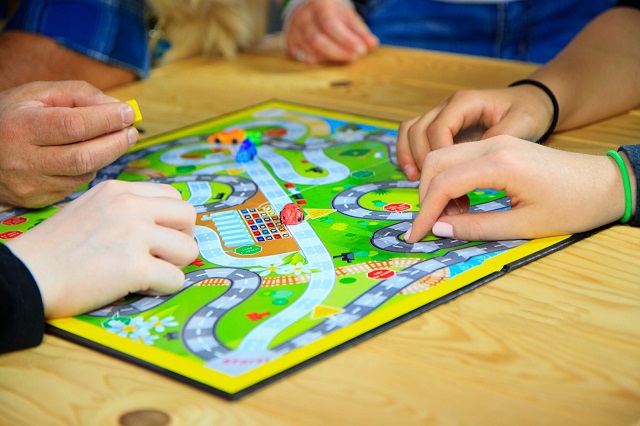
Board games can be defined as a type of game played by two or more players that is played on a pre-marked and predetermined surface, also known as the playing board. The game can involve additionally marked positions, numbered symbols, tokens or pieces and often involve cards or counters and some type of randomization element such as dice.
Board games predate recorded history and continue to be a popular form of entertainment today. In fact, the earliest games likely arose from families gathering around campfires playing simple counting games based on throwing stones in the dirt.
History Of Board Games The origin of board games has long been researched by historians, and some scholars have found evidence that ancient civilizations in Egypt, China, India and elsewhere have played them as far back as 3000 B.C. One example is Senet, an ancient Egyptian game believed to have religious significance which is still played today in parts of Africa.
Archaeologists have also found evidence that the ancient Greeks enjoyed various board games including Tabula (also known as Backgammon).
By medieval times there were various forms of chess being played throughout Europe and Asia. During this time various table top games like 9 Man’s Morris emerged along with playing cards which were common fixtures in households throughout Europe into the 19th century.
Modern Board Games Since then there has been numerous developments to further fuel the popularity of board gaming worldwide. Monopoly was famously developed during 1935-36 while in 1950’s Scrabble became hugely popular among Americans alongside classics like Trivial Pursuit & Clue which appeared during the 1970s-80s respectively and continue to enjoy success until this day.
Furthermore strategic tabletop war-games pioneered by Simulations Publications Inc (SPI) also featured prominently during 1970s becoming enormously popular amongst military/strategy fans.
These days there are hundreds of mainstream & independent game companies developing board styles for all sorts styles audiences ranging from children’s educational titles to complicated adult exclusive strategy/warfare titles like Axis & Allies & Battlelore; while modern European style board games incorporating a mix of skill/strategy alongside chance elements have become increasingly sought after amongst expert board gamers worldwide over recent years too.
History of Board Games
Board games have been enjoyed since ancient times and are still popular today. It is believed that board games originated over 7,000 years ago in present-day Iraq, when a game called ‘Royal Game of Ur’ was first played. This game was an early form of a race board game with two players attempting to be the first to reach the end of the track.
Over time, people began developing other types of board games from strategy and war-type games such as chess and Go, to educational board games to teach mathematics, science and more. With the popularity of commercialization grew for these new forms of entertainment. By the 1800s people were produced customized boards for traditional games such as checkers, backgammon, and dominoes.
The 20th century saw an explosion in both classic inspired board games and newly invented ones. These included Clue (1944), Scrabble (1948), Risk (1959) and Monopoly (1935). Not only have modern versions of these old classics become popular but companies such as Hasbro have released countless other versions including electronic or interactive forms like Battleship Command (1959).
Popularity Of Board Games Throughout The Years
- In 1946 it was estimated that 40 million households in America alone owned a copy of Monopoly.
- At one point there were over 13 editions of Monopoly produced worldwide.
- Scrabble had its first World Championship in 1991 being held in London.
- Now there are official tournaments held across continents with major prize money at stake.
The Renaissance Of Board Games
The 21st century has brought with it the dawningof a “new golden age” for board gaming – also known as ‘modern tabletop gaming’ or even ‘boardgames 2.0’. Everywhere you look there are new releases hitting store shelves; many created by independent developers who are pushing the boundaries with innovative designs and themes which were unimaginable just ten years ago.
In particular – cooperative style play has become increasingly popular due to its ability for groups or families to play together without one individual coming out on top at the end; while expansive universe building game systems allow gamers greater control over customizing their playing experience than ever before. Both features have gone on to inspire generations of recent tabletop gaming aficionados.
Popular Board Games
Board games are an enjoyable way for people to spend quality time together or relax alone. Playing a board game gives people an opportunity to make new friends, test their tactical expertise, think strategically, and develop problem-solving skills – all while having fun. The challenge is in finding the right board game. With this wide variety of available options, it can be difficult to choose the best one for your particular situation.
In order to narrow down your choices and find the perfect game for you, there are certain features that you should consider:
Features To Consider When Choosing A Board Game
- Number of Players: Consider the number of players who will be involved – each game comes with its own rules on the number of players that must be present.
- Age Range: Pick a game that’s appropriate for everyone’s age range.
- Length of Time: Choose a game where all participants can commit to playing for an entire session without hindering other commitments.
- Difficulty Level: Select a board game that’s suitable for all players participating; one with an appropriate level of complexity that would match everyone’s gaming skills.
Another factor to take into account when choosing the right board game is how interactive it is. Some board games are more low-key and leisurely in nature while others require intense focus and strategy. Before selecting a specific board game try testing out samples at hobby stores, bookstores or online communities such as BoardGameGeek so you can get a better idea of what kind of gameplay each provides.
Overall, there are no right or wrong answers when choosing a board game – it depends on individual preference and desired experience. Through careful consideration, everybody can find the perfect match that meets their needs.
Benefits of Playing Board Games
Board games have been popular for centuries, enjoyed by adults and children alike. Not only do they provide a fun way to pass the time, but research has also found that board games can benefit players in several ways. From the mental stimulation of strategy to increased sociability and educational value, playing board games can provide unique advantages to all ages.
Mental Exercise
Many board games involve complex strategies that require skillful decision-making to win. The game Battleship is a great example of this; players plan out their attack directions based on clues about the hidden positions of their opponent’s ships. This encourages thinking skills such as problem-solving and critical analysis. Other classic strategy games, like chess and Go, are even more complex and help sharpen strategic thinking and reasoning.
Social Interaction
Board games don’t just bring mental benefits; they work as a catalyst for social interaction too. Spending time with family or friends over a game creates an atmosphere ripe for meaningful conversations that often wouldn’t happen under usual circumstances. Even if opponents don’t interact much during the actual game-play, it still provides an opportunity to bond over something other than daily life topics such as work deadlines or school pressures.
Educational Curriculum
Playing board games does not need to be limited to a leisure activity either – they can also be used to teach valuable lessons in schools or homeschool environments. Trivia Board Games act like quiz shows with crosswords or other puzzles which teach facts and knowledge in an entertaining way. Even traditional board games such as Monopoly can assist in teaching basic economics by introducing concepts such as supply and demand through buying property around the game board.
Different Types of Board Games for Different Age Groups
Board games are fantastic forms of entertainment and the industry has made a tremendous growth over the past few years. There is something for everyone and from kids to adults, there are different board games available to suit different age groups. Some popular categories include puzzles, role-playing games, strategy games, computer and video based games and traditional game titles like Monopoly.
Board Games for Kids
Younger children usually start with simple board games that have simple rules and bright images. These help them learn basic shapes and colors while also helping them build their communication skills through interaction with other players. Popular game choices for young ones include Chinese checkers, Ludo, Chutes and Ladders etc.
Board Games For Teens
For teens board games become more intricate as they are able to learn complex rules easily now. They lean towards puzzly activities or interactive scenarios like Dungeons & Dragons which involves role play as well as critical thinking skills. Teenagers can also enjoy card games such as UNO, Poker or bridge.
Popular Board Games for Teens
- Dungeons & Dragons: Players create stories while acting out roles in an imaginary world.
- Clue: A classic game in which players need to solve a murder mystery.
- Settlers of Catan: A resource trading game deck building game.
- Ticket To Ride: >A travelling strategy game.
Where to Buy Board Games
Online websites are the easiest way to buy board games, as it is significantly easier and faster than visiting a brick-and-mortar store. Many online websites offer discounts on products and free shipping. In addition, customer reviews can be read online before making a purchase decision.
Retailers like Walmart or Target are another option for buying board games. Retailers often sell many of the newest releases as well as other more obscure titles. Although prices at retailers may not always be exactly the same as those found online, they do frequently have exclusive deals available making them competitive with their online counterparts.
Going to thrift stores such as Goodwill can also be an affordable way to purchase board games, especially classic titles. The benefit of thrift stores is that most of the games will cost far less than going other popular shopping options. Keep in mind however that most thrift stores don’t have new stock coming in regularly, so if you looking for newer titles this may not be your best option.
Some other avenues for finding board games include:
- Local game shops
- Department stores such as Kmart
- Flea markets
- Library book sales
- Auctions
Ideas for Hosting an Epic Board Game Night
Board games are a great way to come together with your friends or family, have some fun, and make lasting memories. From classics like Monopoly to newer options like Ticket to Ride, there are limitless board game titles available for your next board game night.
Hosting an epic board game night is fairly easy, especially when following a few simple tips outlined below.
- Decide on the right type of board game: Depending on the audience, picking the right type of game can be incredibly important. Complex strategy-based games may not be as enjoyable for kids as they would be for adults.
- Choose the appropriate number of players: Knowing the average playtime and making sure that everyone has the chance to participate in the fun is key.
- Keep snacks and drinks readily available: Have everyone gather in one room where they can easily access snacks and drinks throughout the evening.
- Explain the rules thoroughly: It is important to know all of the rules yourself before attempting to teach them to others. Set aside enough time so that everyone is clear on how to play.
- Play multiple rounds (if applicable): This will increase every person’s comfort level with regards to their understanding of the rules and provide more opportunities for laughs and entertainment.
align=”justify”>Done correctly, a board game night can create wonderful memories that last a lifetime. Preparing for such an event requires planning ahead and inviting those closest to you; having a variety of funny stories while playing along is also advised. Make sure everything runs smoothly – from setting up tables and chairs in advance, downing candy and drinks during each turn spent by discussing random facts or guessing movie quotes.
align=”justify”>Once all preparations are set in place – it’s time to get going. Once seated around a boardgame table, keep in consideration these tips: define who will start first according with specific rules debated beforehand (example “the youngest starts first”), remind participants for courtesy plays while passing turns around – because active listening sets over competitive manners.
As lunch or dinner breaks are taking place during turns exchange feel free if you want snacks&drinks by your side or use this opportunity for bio breaks or finally starting that movie marathon.
align=”justify”>While competing against friends & family within expected scenarios – let loose & make it even funnier by including home made rules that involve teasing & funny rewards depending on who wins at certain middle points within any specific action plan created before hands-on (exemple getting caught “Do Not Disturb” signs while cheating).
Despite winners And loser – remember from pizza phrases quoting : Friends don’t let friends go hungry nor unhappy so end this evening sharing experiences & knowledge from smart moves played along unpredicted twists.
Tips for Making Board Games More Fun
Board games are one of the best forms of entertainment that can be enjoyed with family and friends. Whether it’s a casual fun-filled night or part of an organized party, board games are a great way to bring people together in close-knitted social activities.
Through face-to-face interaction, laughter and even a bit of scuffle when taking turns as players develops strategy and skills. While often featuring objective goals such as reaching a certain point value or area on the board, there is also potential for creativity in your own rules.
One popular way to change up the game is by looking for creative rules to modify your version of the game. Simple changes such as allowing two players to take one turn at a time or altering the point system might surprise everyone with just how different and exciting the game play can be.
On many apps nowadays you can tailor rules to your liking or find user submitted ones that will add various ways of playing. Another trick is to customize items related to pop culture characters, which make each game experience even more unique.
In addition to adjusting the rules, there are also many creative uses for board games that will keep each round interesting and engaging. Upcycle cardboard from boxes into pieces you can use in your favourite games such as making tokens out of paperclips and pencil erasers, or make fun new boards tailored around subjects such as sports teams or local landmarks – this will allow you greater transportable options at home or while traveling too boot.
You can even create Super Puzzles where several boards connect into one large group challenge; not only adding bonus points but creating connections between player relationships. Finally, you can always increase difficulty with modifiers such as extra dice rolls needed before completing a task thus adding an additional layer of difficulty which would makes things especially competitive.
Conclusion
Board games have been played throughout history, dating as far back as 3,000 BC in ancient Egypt and India. Today, there are hundreds of board games to choose from – educational, family-friendly or even strategic.
Board games bring people together through an entertaining and interactive experience. Whether it’s a single-player game like solitaire or a two-player game like chess, the main focus is on playing with others and having fun – making them a popular choice for get-togethers and parties. The appeal of board games does not come solely from their entertainment value; they also provide opportunities for skill development in areas such as problem solving, communication and basic math skills.
The varying levels of complexity across different board games makes them appealing to hundreds of millions of players across the globe. Almost any age can find a board game to suit their level and interests. This means that families can enjoy challenging one another without feeling the pressure of mastering something too advanced for everyone.
Board games are so popular because they offer an engaging activity where people can relax, challenge each other and have plenty of fun at the same time; something which modern video gaming struggles to provide despite its ever-expanding capabilities. Board games have endured over centuries because they are perfect for socializing with friends while being stimulating enough to prevent boredom.
Furthermore, new board game editions are often released to cater to every type of genre imaginable so there will always be something new for fans to explore – ensuring further endurance into the future.




